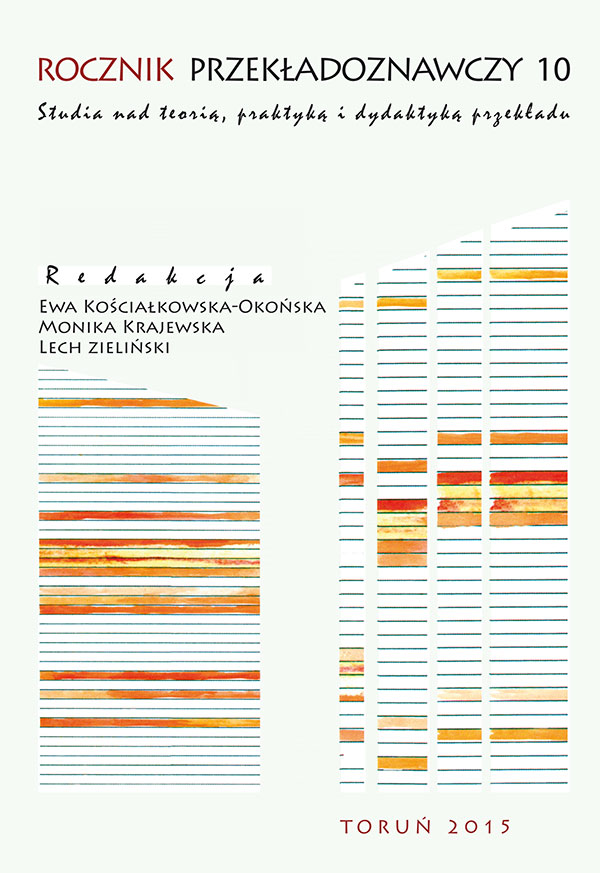Think-aloud protocols in translation into the mother tongue at the advanced level
DOI:
https://doi.org/10.12775/RP.2015.015Keywords
think-aloud protocols, foreign language teaching and learning processes, learning strategies, mother tongueAbstract
The purpose of this paper is to analyse think-aloud protocols in translations from a foreign language into the mother tongue and to present the function of translation in the language teaching process. Research on the translation process with the application of think-aloud protocols gives a running commentary on mental activities during the process of translation. The author investigates language learning strategies in translations from German into Polish written by students of Applied Linguistics. The most frequent strategies used by the respondents in the study were cognitive strategies, word-for-word translation and data analysis. The aim of the present study was also to reveal and to describe problems that occur during the translation process on examples taken from students’ works. Students’ verbalisations provide us with the opportunity of acquiring a better understanding of difficulties they encounter with the foreign language, the mother tongue or the language for special purposes as well as difficulties in reading texts in the source language.
References
Der kleine Duden. Mała gramatyka języka niemieckiego, 1997, Warszawa.
Dzierżanowska, H., 1988, Przekład tekstów nieliterackich. Na przykładzie języka angielskiego, Warszawa.
Encyklopedia szkolna. Matematyka, 1990, Warszawa.
Grucza, F., 1981, „Fremdsprachenunterricht und Übersetzung”, [w:] Übersetzen und Fremdsprachenunterricht, K.R. Bausch, F.R. Weller (red.), Frankfurt/M, s. 32–45.
Jaworski, M., 1980, Podręczna gramatyka języka polskiego, Warszawa.
Jäger, G., 1981, „Übersetzen und Übersetzung” [w:] Übersetzen und Fremdsprachenunterricht, K.R. Bausch, F.R. Weller (red.), Frankfurt/M, s. 61–72.
Karczewska, D., 2002, „O błędach w tłumaczeniu”, [w:] Język rodzimy a język obcy. Komunikacja – przekład – dydaktyka, A. Kopczyński, U. Zaliwska-Okrutna (red.), Warszawa, s. 129–135.
Königs, F.G., 2000, „Übersetzen im Deutschunterricht? Ja, aber anders”, [w:] Fremdsprache Deutsch. Übersetzen im Deutschunterricht, Heft 23, s. 6–13.
Lelewicz, M., Linkiewicz, H., 1967, Deutsch. Podręcznik języka niemieckiego dla lektoratów Studiów Nauczycielskich, Warszawa.
Lipiński, K., 2000, Vademecum tłumacza, Kraków.
Michońska-Stadnik, A., 1996, Strategie uczenia się i autonomia ucznia w warunkach szkolnych, Wrocław.
Nowy słownik poprawnej polszczyzny, 2002, A. Markowski (red.), Warszawa.
Pieńkos, J., 1993, Przekład i tłumacz we współczesnym świecie. Aspekty lingwistyczne i pozalingwistyczne, Warszawa.
Płusa, P., 2007, Rozwijanie kompetencji przekładu i kształcenie tłumaczy, Katowice.
Snell-Hornby, M., 1994, „Einleitung. Übersetzen, Sprache, Kultur”, [w:] M. Snell-Hornby, Übersetzungswissenschaft, Tübingen, s. 9–29.
Strasser, M., 2008, Verständigungsstrategien bei sehr geringen Sprachkenntnissen. Eine explorative Studie zur Kommunikation unter Bedingungen der Interkomprehension, Wien.
Szarska-Wieruszewska, J., 2004, Lernstrategien als Grundlage der lerntypischen Fehlerbehandlungen. Forschungsstudien am Beispiel der Deutsch lernenden, polnischen Studenten, Hamburg.
Tomaszkiewicz, T., 1996, „Operacje procesu przekładu”, [w:] Współczesne tendencje przekładoznawcze. Podręcznik dla studentów neofilologii, A. Pisarska, T. Tomaszkiewicz (red.), Poznań, s. 63–214.
Witkowska, M., 2010, „Zastosowanie protokołu głośnego myślenia i retrospekcji w badaniach autorefleksji przyszłych nauczycieli języka angielskiego”, [w:] Neofilolog, nr 34, s. 147–157.
Downloads
Published
Issue
Section
Stats
Number of views and downloads: 728
Number of citations: 0



